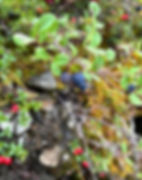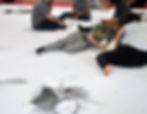Queering the Canon
Bard College
2024
What makes an artwork “queer?” What sorts of composition-building methods and material explorations move "against the grain" of painting conventions? Research includes focused explorations of queer practices that intersect with those of marginalized communities globally, and an examination of the intersection of artistic practices with social and political activism.
"Notation" as Art Practice
University of Alaska
2023
How do we make a map or a diagram of that which is intangible, or too big to process, or not describable through words? How do we translate one form, or one sense, into another? Could we notate sounds, movement, feelings, forces of nature through abstract marks? When do these notations themselves become works of art?
Reciprocal Art Practice
University of Alaska, Fairbanks
summer 2023
Intensive
How can we envision and practice forms of artmaking that reclaim and rectify our relationship to the natural world and to one another? Grounded in approaches to art making that forefront listening, attentiveness, and sensory experience, participants are led in philosophical inquiry, collaborative and experimental visual art practices, and practical techniques. Participants practice historic methods for making their own art materials, acknowledge and support indigenous methodologies, and survey a range of contemporary practices. These practices seek sustainability and accountability.
Creative Practice Across the Disciplines
University of Alaska, Fairbanks
summer 2021
Intensive
With an emphasis on perception, play, and collaboration, and drawing upon the visual and performing arts, participants engage in processes that can be applied to all fields of inquiry.
The class emphasizes the building of a holistic, multi-faceted practice while taking into account issues of sustainability, justice, and equity.
Sustained Observation
& Mindfulness
Museum of the North
September 2021
Mt. Holyoke College Art Museum
September 2019
Participants are guided in contemplating collection objects that span centuries and cultures. Each participant will meditate upon a work of art for 60 minutes, sparking curiosity and wonder as they utilize techniques that build mindfulness and foster self-realization. The workshop is a unique opportunity for an intimate experience with extraordinary works of art, including many that are rarely on public view, and with a special emphasis on indigenous culture.
Drawing as a Conversation
Nanook Diversity and Action Center
Interdisciplinary Graduate Programs
University of Alaska Fairbanks
August-September 2021
Working in silence and without text, participants use drawing exercises to observe, listen, and communicate differently.
Performance for Video
Advanced Performance for Video
The Pig Iron School
2020-2021
How can we take agency over the way our identities and our bodies are captured on camera? How do we manage ownership of our stories and ourselves as we negotiate social distancing and social media? How do the dominant forms of media, including film and television, reinforce ideas around who should be seen and heard? Inspired by the radical histories of performance art and experimental video art, we will perform for the camera in complex, compelling, playful and weird ways.
Painting on Camera
Crit Lab NY
2020
(online)
This workshop is focused on painterly mark-making – broadly speaking – and how the process and results of this mark-making have been documented through photography, film, and video in the postwar period. Through dialogue and hands-on experiments, participants think through and process how this mark-making is “performed,” both in the studio and in live performances, and how documentation of “painters painting" has influenced our conception of painterly process.
Interdisciplinary Workshop for Dancers and Visual Artists
Dickinson College
2019
Body movement, sensory awareness, and collaboration are explored in guided interactions between fine artists and performers.
Draw, Paint, Perform
Mt. Holyoke College
2019
The workshop provides exercises in tactility, listening, careful observation, and composition building as a way to deepen one’s visual thinking and mindfulness. Each participant is challenged to consider sensorial perception and physicality as it applies to their working process. Participants are asked to re-think form in a more holistic manner, considering the whole life of objects from their conception to their installation.
Participants are guided through a series of movement-based exercises and prompts that are then translated into dynamic individual and group compositions – drawing and painting as an embodied practice.
Embodied Practice &
Sustained Observation
New England College
The Currier Museum
2020
In this two-day workshop, participants are led through dynamic composition-building exercises, exploring materials and form, building tactility and adapting to change. In part-two, they undertake individual, sustained observation exercises with primary source material, and then engage one another in dialogue as they report their findings. Participants apply these findings to their respective studio practices and broader professional lives.
Creative Play & Collaboration
Interdisciplinary workshop for graduate students
Fashion Institute of Technology, NYC
University of the Arts, Philadelphia
2019
Designed to connect graduate students across their disciplines, the workshop provides a space for creative play and commmunity building, while providing opportunities for interdisciplinary practice and methodologies for material exploration.
Performance for Visual Artists
Krabbesholm Højskole
2014 / 2015
Bowling Green State University
2013
Participants are guided through movement and improvisational exercises, realizing an embodied practice through experiments with drawing, painting, and performance art. Individual and group work encourages collaboration and cross-disciplinary practice. Perceptual and sensorial methods are emphasized as students become more deeply attuned and accountable to the people and spaces around them, recognizing our interconnectedness and the significance of how we treat and care for our shared environment.
Visual Art for Performers
The Pig Iron School
2015-present
This course introduces performers to principles of form and materiality in visual art production. Participants consider compositional principles and material properties using a range of media, techniques, and approaches, applying and taking into account the specific issues faced by performers, including spatiality, the expressivity of the body, the role of the audience, and the design of visual elements as they unfold in time and space. Visual art tools are in turn applied to performance practices while providing a deeper understanding of the relationship between the two.
















































